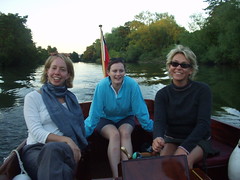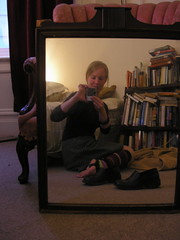Identity and the expert.
My identity is not where I left it.
I woke up this morning feeling weak and wan; that confused feeling of three weeks is still there.
So forgive me for not returning your emails whenever I failed to return them over the last six months. Forgive me for not blogging over the last month.
I've been having an identity crisis.
Here's what happened.
Three weeks ago an old friend from college stopped by for a drink. We
were discussing the culture of gambling and the toll advanced
capitalism on our well-educated ambitious twenty-somethings. We
looked at some pictures from the paper I had written as a reflectly --
a paper on the history and evolution of the casino.
Amongst the pictures, we saw some images of me three years ago. A
first-year going on second-year PhD student at Berkeley, traveling
through Germany with my then boyfriend, the British barrister with his
political connections. At the time I was trying to imagine what it
would be like to live out my days as a politician's helpmeet, or
a fellow-politician, or a political academic, rather than as someone whose immediate sense of self depended on winning the theoretical battles of academical journals, as I had long expected it would. Here I was, doing ethnology for real -- I was giving fabulous parties; I was getting to
know the savants of British think tanks; I was charming; I was learning what charm really meant, and how power flowed around it. The booki I could have written. Or the life I could have lived.
Here is a picture of me laughing. My friend from college (straight as a speeding bullet) said,
"That is a very beautiful, a very natural laugh. It must have been
hard work to get that laugh so perfect."

I had an identity crisis. I am having an identity crisis. As I look at that picture my stomach
feels empty, as if there is a balloon of air centered in it. This is
the space where I hold questions.
Every morning I wake up and find
it still unfilled. Every hour I say a prayer that fragments will fill
it with something fresh, mobile, alive, alert, and responsive to the
universe.
I was taken aback by that photo, because it is very unlike me now.
Here I am, with legwarmers, hair uncut for a year, and some local punk nonsense blaring the background.

Who is this person? What do people think when they see the ripped and torn sweaters, the pile of books? While I was in disguise before, men used to ask me whether I was the type of girl who owned thirty pairs of shoes. It always made me laugh. I've never owned more than five. Here I am, the girl with the immense bookshelf. I listen to bands. I drink with the boys. I eat raw, organic food. I talk to strangers.
That empty stomach part of me is, in
a certain way, jealous of the scholar of casinos, the ethnologist (by participation) of elites, and hungry to perform *something* again.
Sometimes it makes me jealous of my friends. You know, the grad student who gets interviewed by the New York Times. The ones with the famous blogs. The ones with the predictable fashion sense. I go to the Zeitgeist bar down the road, and lurk at the table where
the goths are discussing lingerie, and the hipsters discussing tattoos,
and the bikers discussing some fight down the road, and the academics
discussing some book.
Strangers know who they are. They don't know who I am.
I miss performance.
What was that place, where the theological questions of comp lit (who what where why
the universe, gender, privacy, capitalism -- why and how its
seductions, what form, what kind, what shape) had taken on such
substance that they were being lived out in my day-to-day interactions
with politicians, lawyers, bartender, hostellers, retirees, innkeepers,
history, the present, and the future.
Some part of me wants, that is, to be a scholar of the present. A
cultural critic. A public intellectual. An eternal prophet. I know
that I'm a dilettante. I know the world has little practical use for my kind of expertise.
What is left for me to perform?
In praise of synthesis
The conversation about casinos was the first time in six years - long before grad school - that I had shared with another person that constant whirring of gears in the back of my head -- that place where the critical backdrop of the Harvard lit department infected my mind with deep mythologies, metonymy, metaphor; identity, formation, disintegration, synthesis; cultural analysis of so strict and perfect a form that I blushed to talk to other academics about mere hegemonies and resistances to power. This is something I am, but it is something I refuse to perform.
Why alienate an audience by talking to them about the complex tissues and formations of their existence? How much better to present them with some crystalized jewel of experience, some rarified observation they could not reach themselves but appreciate in its perfect and transportable form?
Grad School has been, for me, about becoming a good listener: about learning to understand the languages of architects, geographers, political historians, psephologists, political scientists, career military, economists, marketers. Each has its own language, its own data, its own way of working with the data, and its own products it quests after. I have been made sensitive. I can recreate some projects but not others. Again and again I find myself isolated as the only listener in the room -- the only person outside of an expertise. The only person forging a bridge. To be in such a position is an artifact of twenty-first century expertise.
A different kind of expertise.
Is that good enough? Shall we keep these experts together? What have they to say to organic identities, real individuals whose depth exceeds the bounds of one profession? What of the worn out? What of the consultant or lawyer who doesn't wish to work 80-hour-weeks? What of the mind whose perameters exceed the structure of the discipline?
Will the expert of the twenty-first century still be like these masters of fact, these twentieth-century potential gurus of economics and psephology, each striving to be better than his peers in a particular sphere? Surely the powers that be need someone to interpret what each field really means to say -- the relevance of one expertise to the rest, the relevance of the fact to the whole. Increasingly this ability is a rare one. But where will the cross-disciplinary masters of the universe be found? Where will they find the other listeners, the other dilettantes?
I look at the picture of myself three years ago and my mind reels. Here I am in a smelly sweater in the Mission district, coming home from beer at the biker bar down the street. I am comfortably in my own skin now, and I was comfortable then. I could go and talk to barrister and politicians this evening if I had to, or scoot down to the docks with a hipster and talk union politics with the longshoremen. Sure. It's certainly *different* than the talent set of your average politician or hipster. Does that do me any good? Does it make me happy?
Looking there is almost painful. It's hard to concentrate on. I don't have an answer, and I'm ready to stop asking these questions.
I'm holding these facts around me -- not so much proud of diverse experiences as confused as to where to place them. How do you perform the fact that you've been other places? How do you articulate to the stranger that you have valuable talents precisely because you're the one stranger in the crowd who will say nothing but only listen?
I'm picking up these pebbles of experience from the seashore and walking around with them in my palm, unsure of what to make of them. I don't know if they're for use. Maybe there's a class of experience that's purely spirtual, and not for use. Maybe there's a class of knowledge that can't be summed up by any expertise.
*squints*
Technorati Tags: identity, self, ego, subconscious, disciplinarity, discipline, experts, expertise, postmodernism, performance, hipsters, professions, professionalism, strangers










0 Comments:
Post a Comment
<< Home